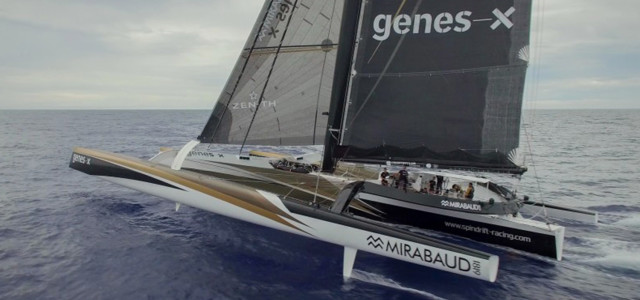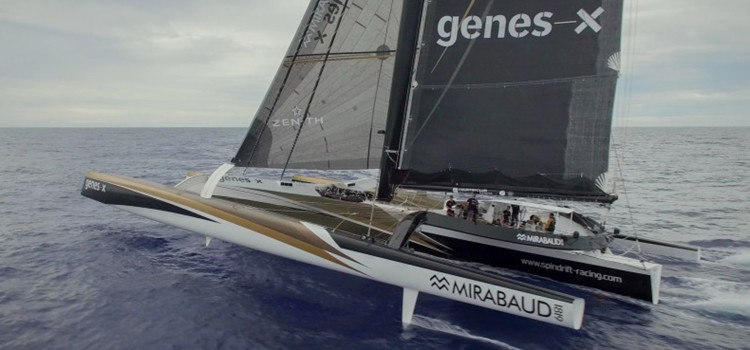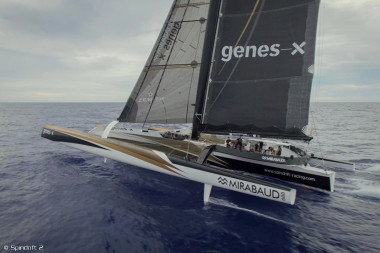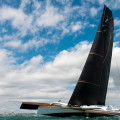

Jules Verne Trophy, 4 days 21 hours 29 minutes: and now the Equator
Breaking newsMultiscafiOceanoRecordSpindrift 2Trofeo Jules VerneVela 27 Novembre 2015 Zerogradinord 0

 Atlantic Ocean – Spindrift 2 crossed the equator at 0131hrs UTC on Friday 27 November, just under five days after setting off! Yann Guichard and his crew are on world-record pace. Current Jules Verne Trophy holder Banque Populaire V crossed the equator in 5 days, 14 hours, 55 seconds in 2011. The trimaran must now negotiate the trade winds of the Southern Hemisphere as she makes her way to Cape of Good Hope.
Atlantic Ocean – Spindrift 2 crossed the equator at 0131hrs UTC on Friday 27 November, just under five days after setting off! Yann Guichard and his crew are on world-record pace. Current Jules Verne Trophy holder Banque Populaire V crossed the equator in 5 days, 14 hours, 55 seconds in 2011. The trimaran must now negotiate the trade winds of the Southern Hemisphere as she makes her way to Cape of Good Hope.
Spindrift 2 (and the trimaran, IDEC Sport, departing two hours earlier) took advantage of exceptional weather conditions to cover the 3,171 nautical miles (as the crow flies) between Ushant island (Brittany) and the equator in just 4 days, 21 hours, 29 minutes and 2 seconds, averaging a remarkable 26.99 knots. This first milestone on the crew’s circumnavigation is important not only important in terms of timing, but also mentally for the crew, since, even with the benefit of hindsight, they know they chose the right weather window for their departure.
Full steam ahead!
Spindrift 2 is 17 hours, 25 minutes and 16 seconds up on 2011 record, or 13% faster than the previous time, and over 277 miles ahead, thanks in particular to the fairly straight route taken by the trimaran. Dona Bertarelli and Yann Guichard have sailed only 3,326 miles, having made only one major manoeuvre, a jibe off the Azores, whereas the current record holder sailed 3,582 miles to reach the equator, a difference of 256 miles to reach the same latitude! Spindrift 2 will now sail along the Brazilian coast in 15-knot south-easterlies until they reach the latitude of Rio de Janeiro, where they will need to hook onto the first southern hemisphere depression to catch a fast ride to the Roaring Forties.
Yann Guichard spoke by telephone on Thursday evening: “We were still in the doldrums at the end of the afternoon. There were small windless squalls all round and speeds varying from 4 to 25 knots. We’ve been in the Intertropical Convergence Zone (ITCZ : violent squalls alternate with dead calm) since 2 am on Thursday, when the first squalls kicked in, but we’ve always had a bit of wind, with really strong gusts every now and again. This is all pretty usual for the doldrums, where the wind is unstable, but unfortunately they moved south with us!”
“It meant we had to do quite a few manoeuvres and make sail changes, sometimes almost immediately after having just finished one. One reef, two reefs, gennaker, genoa, jib. We’ve had almost the entire wardrobe out! But we’ve never been at a full halt. We can just make out a little sunshine to windward with clouds starting to form, which suggests that the end of the tunnel is nigh. I hope we manage to latch onto the more stable south-east trades by nightfall, in which case we might make it across the Equator in the middle of the night. If we make it by 5:02 (CET), that would mean less than five days, but our friend (Francis Joyon and his crew) is not far behind and is sailing fast!”
“The crew has been working hard since the tough start across the Bay of Biscay, and now in the doldrums. But everyone is in the swing of things now. We’ve been able to give the boat a good check-up and everything’s fine on board. We’re ready for the next stage! The guys are just a little disappointed not to have had big rainy squalls today; they’ve not been able to take a shower! But anyway, we’ve had a nice start and now we’re going to concentrate on the southern hemisphere and follow on as fast as we can to the Cape of Good Hope.”




No comments so far.
Be first to leave comment below.